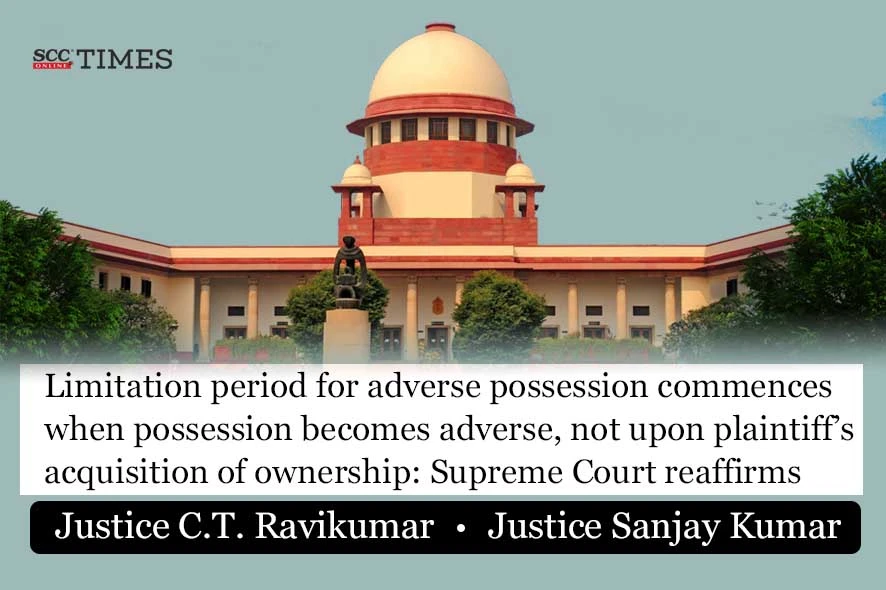Supreme Court: In an appeal filed against the Judgment passed by Chhattisgarh High Court, reversing the concurrent judgments of the Courts below, the division bench C.T. Ravikumar* and Sanjay Kumar, JJ. while upholding the impugned judgment, said that in cases of adverse possession, the period of limitation for proving title starts from the date the defendant’s possession becomes adverse to the true owner rather than from the date the plaintiff acquires ownership. This means that the statutory clock starts ticking once the possession is open, notorious, exclusive, and hostile to the interests of the original owner.
Background:
Respondent 1 filed a civil suit against the appellants for recovery of possession of suit schedule property based on title besides claiming damages to the tune of Rs. 10,500/- and future damages at the rate of Rs. 1000/- per acre and for costs. It was averred that he purchased the suit schedule property from the common cousin of himself and the appellants.
The Trial Court held that the evidence on record would reveal that prior to the year 1952, the father of the respondent 1 and father of appellants were carrying on business in Bangles jointly. This Joint business creates a strong presumption of joint family. The Trial Court also held that the age of the vendor who was the common cousin of the parties was 22 years and hence, at the time of purchase of the said suit schedule property, he must have been aged only 17 years. Thus, after purchase suit land was the Joint Hindu Family Property which was purchased by father of the appellants in the year 1963 jointly with his brothers in the name of the common cousin. Therefore, the cousin had no right to sell the suit land therefore, the execution of the sale deed was without any authority or right and, therefore, it is void.
Thereafter, the First Appellate Court dismissed the appeal and confirmed the dismissal of the suit. Following, the High Court by the impugned judgment reversed the concurrent judgment and decree of dismissal of the suit and allowed the same after setting them aside by holding that the appreciation of evidence by the courts below was perverse and on a proper appreciation of evidence on record felt that the respondent 1 had succeeded in establishing title over the suit land.
Analysis and Decision:
The Court reiterated that evidence can be permitted to be given only on a plea properly raised and not in contradiction of the plea.
The Court referred to the pleadings of the appellants in their jointly filed written statement.
The Court accepted that the finding of the High Court that respondent 1 is the owner of the suit schedule property is the correct conclusion on assimilation of facts and appreciation of evidence, as the sale deed dated 04-06-1968 is a registered sale deed whereunder the respondent 1 had purchased the suit land from the common cousin.
The Court noted that though the First Appellate Court reversed the finding of the Trial Court that suit land is a Joint Hindu Family property, it did not consider in detail and arrive at any positive finding as to the correctness or otherwise of the declaration of the Trial Court of sale deed as void. The Frist Appellate Court did not set it aside.
The Court mentioned that Section 6(h) of the Transfer of Property Act provides inter alia, that no transfer can be made “to a person legally disqualified to be a transferee.” Section 7 of the Transfer of Property Act provides that every person competent to contract is competent to transfer property to the extent and in the manner allowed and prescribed by any law for the time being in force.
The Court added that though an agreement to sell is a contract of sale, going by its definition under Section 54 of the Transfer of Property Act, a sale cannot be said to be a contract. Thus, a minor can be a transferee though not a transferor of immovable property. Therefore, in the present case, the cousin had no legal disability or disqualification at the time of purchase of suit land on 15-03-1963 in his name as also the respondent 1, as a transferee, at the time of execution of sale deed on 04-06-1968. Thus, the sale deed was not void, and the respondent 1 had acquired ownership over the property on the strength of the sale deed.
Concerning the issue that whether the High Court was right in declining to accept appellants’ contention that they perfected the title over the suit land by adverse possession, the Court said that the evidence on the part of the appellants would reveal that instead of establishing ‘animus possidendi’ under hostile colour of title, they have tendered evidence indicating only permissive possession and at the same time failed to establish the time from which it was converted to adverse to the title of the respondent which is open and continuous for the prescriptive period.
Thus, the Court held that the requirements to co-exist to constitute adverse possession are not established by the appellants, and the reckoning of the period of limitation from the date of commencement of the right of ownership of the respondent 1 over the suit land instead of looking into whether they had succeeded in pleading and establishing the date of commencement of adverse possession and satisfaction regarding the prescriptive period in that regard, was rightly interfered with, by the High Court.
Thus, the Court upheld the well-merited decision of the High Court in the impugned judgment.
CASE DETAILS
|
Citation: Appellants : Respondents : |
Advocates who appeared in this case For Petitioner(s): For Respondent(s): |
CORAM :








